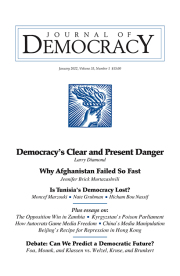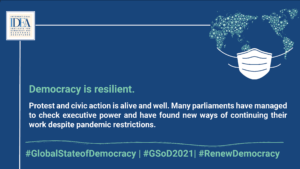 The technological revolution and the failure of free-market competition to protect factual reporting have left news outlets—particularly smaller players—increasingly vulnerable to authoritarians’ sharp-power influence campaigns, notes Edward Lucas, senior nonresident fellow at the Center for European Policy Analysis.
The technological revolution and the failure of free-market competition to protect factual reporting have left news outlets—particularly smaller players—increasingly vulnerable to authoritarians’ sharp-power influence campaigns, notes Edward Lucas, senior nonresident fellow at the Center for European Policy Analysis.
Information is a weapon—and one that can be used against us. This is an uncomfortable truth for open, democratic societies, he writes in How Autocrats Undermine Media Freedom, an essay for the latest issue of the Journal of Democracy. Moreover, the media industries—whether in established industrial democracies, in their postcommunist counterparts, or in emerging economies—are far more vulnerable than we realized in 1989:
- First, news outlets have faced wrenching changes in their business models, changes that are driven by a technological revolution.
- Second, features of the media system such as competition, openness, fair-mindedness, and prudence, once seen only as strengths, have also turned out to be weaknesses.
 Cultivating media resilience in the face of intimidation requires a combined statutory, normative, and civil society effort to make authoritarian pressure tactics so ineffective that they are no longer used, Lucas contends:
Cultivating media resilience in the face of intimidation requires a combined statutory, normative, and civil society effort to make authoritarian pressure tactics so ineffective that they are no longer used, Lucas contends:
- The first thing to do is to make institutions more resilient by persuading them to cooperate in response to threats. News outlets should compete against one another, but there may be times when bad actors exploit competitiveness, tempting people and organizations with commercial or professional advantages in order to play divide-and-rule. Journalists and editors already display some solidarity in response to threats, through trade unions, editors’ associations, press clubs, and media-ethics programs.
- For maximum resilience, however, we need to add a specific threat-related dimension. We need to think strategically about the allocation of resources, research, and outreach. We need to study manipulative tactics in order to counter them. Imagine if news outlets pooled their efforts to bring in heavyweight legal support for investigative journalism. A hostile oligarch or autocrat would think twice before trying to intimidate a small media organization if he knew it could call on a multimillion-dollar legal-defense fund.
We need to accept the bleak truth that we are losing the battle of ideas with authoritarian regimes, not because our ideas are weak, but because we have let the battlefield be skewed against us. If we fail to rise to this challenge, our information systems will cease to be a bulwark against hostile sharp power, and will instead become a vector for its transmission, Lucas adds. RTWT







